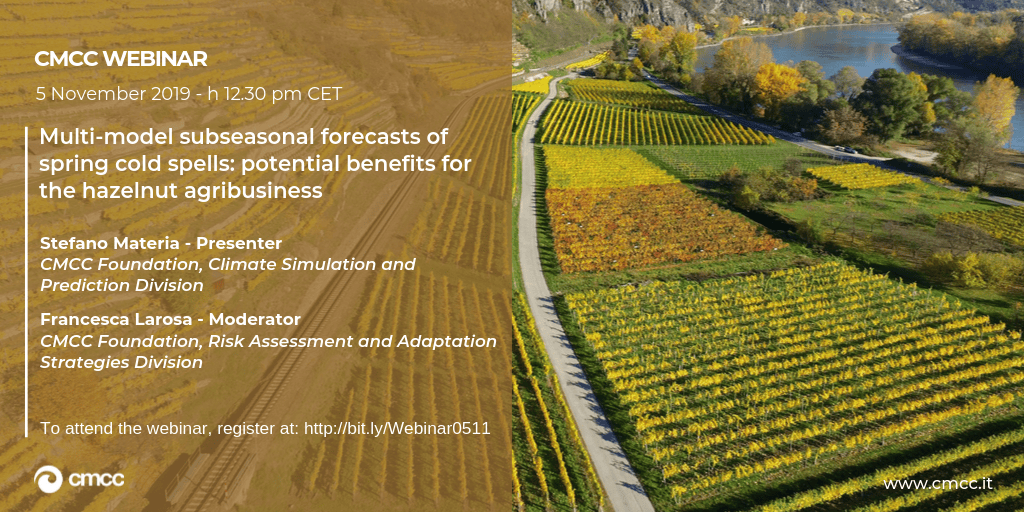CMCC Webinar | 5 November, 2019 – h. 12:30 pm CET
Presenter: Stefano Materia, CMCC Foundation – Climate Simulation and Prediction Division
Moderator: Francesca Larosa, CMCC Foundation – Risk Assessment and Adaptation Strategies Division
Producing probabilistic subseasonal forecasts of extreme events up to six weeks in advance is crucial for many economic sectors. In agribusiness, this time-scale is particularly critical because it allows for mitigation strategies to be adopted for counteracting weather hazards and taking advantage of opportunities. For example, spring frosts are detrimental for many nut trees, resulting in dramatic losses at harvest time. To explore subseasonal forecast quality in boreal spring, identified as one of the most sensitive times of the year by agribusiness end-users, we build a multi-system ensemble using four models involved in the Subseasonal-to-Seasonal (S2S) Prediction Project. Two-meter temperature forecasts are used to analyze cold spell predictions in the coastal Black Sea region, an area that is a global leader in the production of hazelnuts. When analyzed at global scale, the multi-system ensemble probabilistic forecasts for near-surface temperature is better than climatological values for several regions, especially the Tropics, even many weeks in advance; however, in coastal Black Sea skill is low after the second forecast week. When cold spells are predicted instead of near-surface temperatures, skill improves for the region, and the forecasts prove to contain potentially useful information to stakeholders willing to put mitigation plans into effect. Using a cost-loss model approach for the first time in this context, we show that there is added value of having such a forecast system instead of a business-as-usual strategy, not only for predictions released one to two weeks ahead of the extreme event, but also at longer lead-times.
Agenda
12:30 pm – Introduction – Francesca Larosa
12.35 pm – Presenter’s talk – Stefano Materia
1:00 pm – Q&A Session – moderated by Francesca Larosa
1:20 pm – End of Webinar
WebinarWorking language: English
Watch the video:
How to participate
The seminar will be broadcasted via Go-to-Webinar.
Please, click on the following link for registration:
https://register.gotowebinar.com/register/3115733780687519746
After registering, you will receive a confirmation email containing information about joining the webinar.
Organized by
Fondazione CMCC – Centro Euro-Mediterraneo sui Cambiamenti Climatici
Contacts


